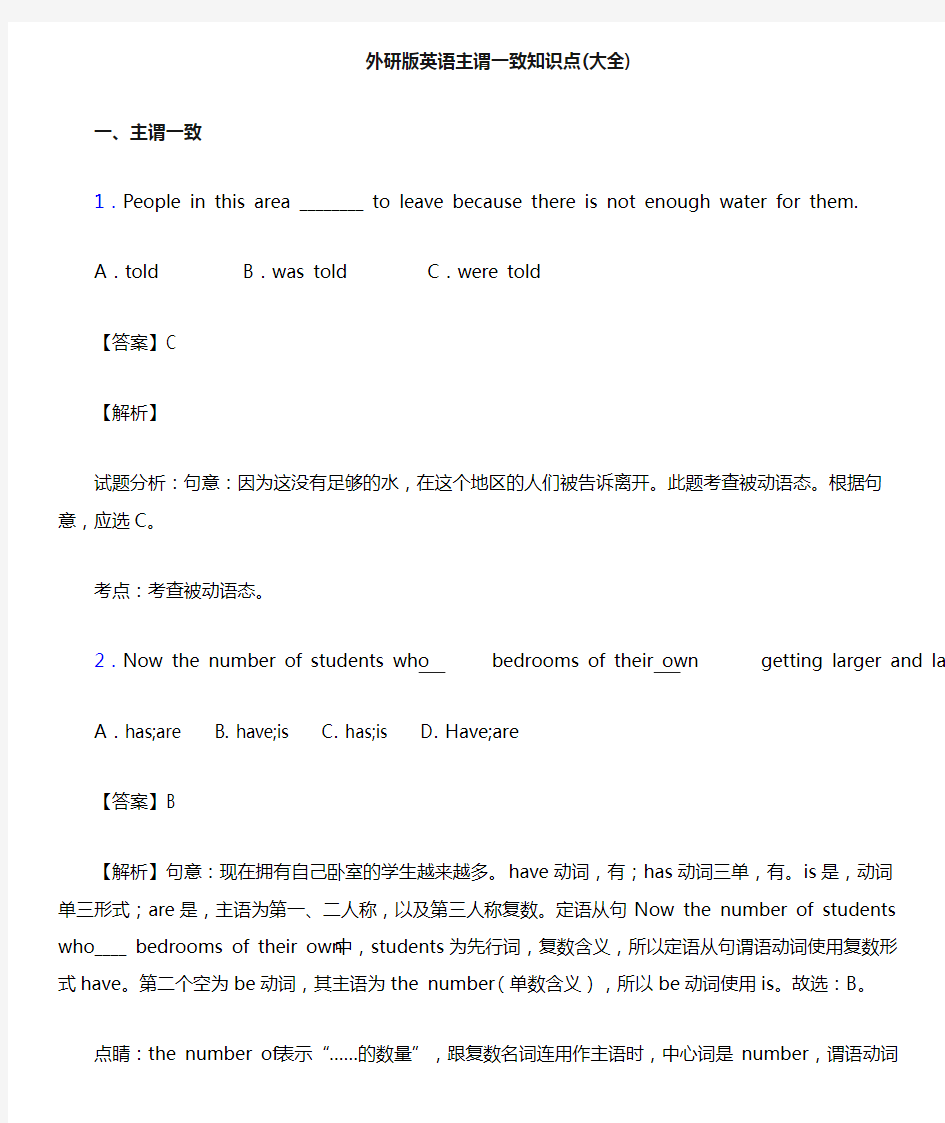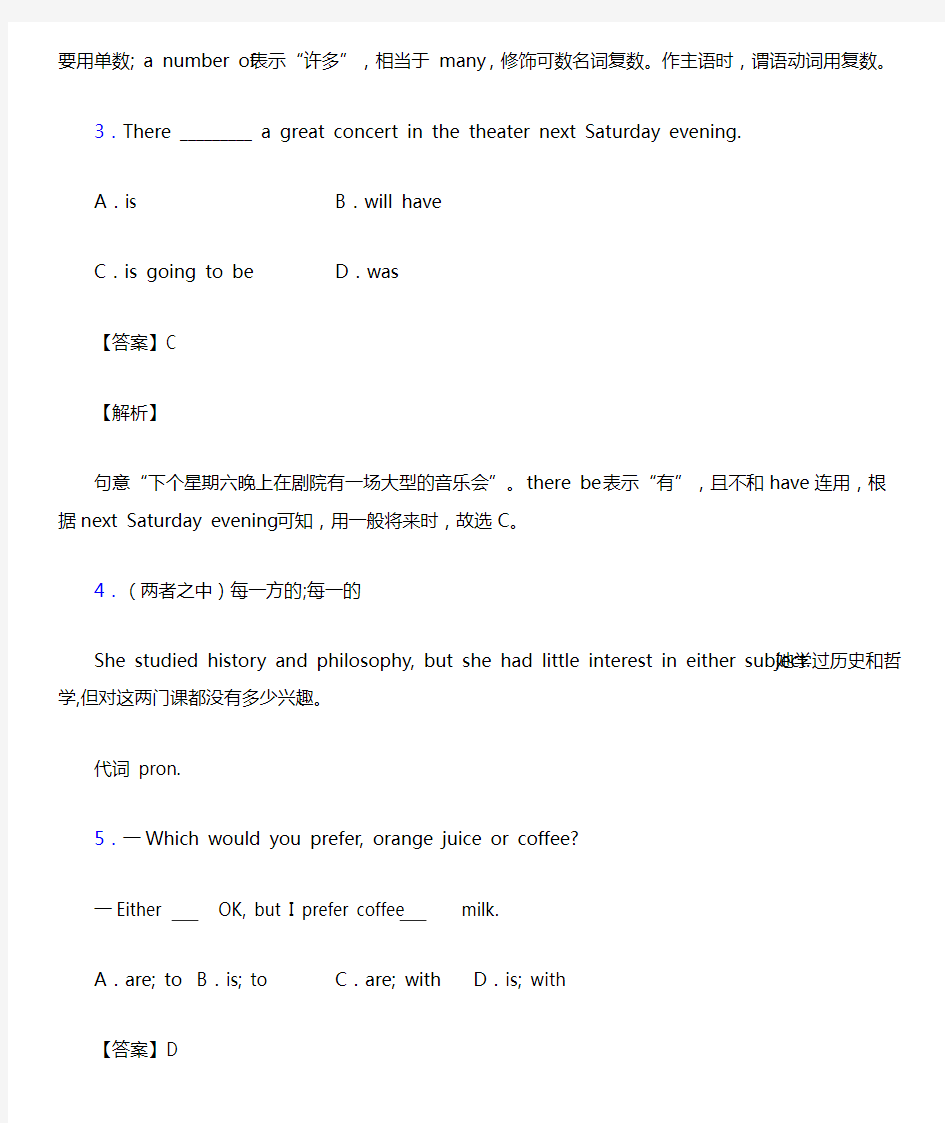

外研版英语主谓一致知识点(大全)
一、主谓一致
1.People in this area ________ to leave because there is not enough water for them.
A.told B.was told C.were told
【答案】C
【解析】
试题分析:句意:因为这没有足够的水,在这个地区的人们被告诉离开。此题考查被动语态。根据句意,应选C。
考点:考查被动语态。
2.Now the number of students who bedrooms of their own getting larger and larger. A.has;are B.have;is C.has;is D.Have;are
【答案】B
【解析】句意:现在拥有自己卧室的学生越来越多。have动词,有;has动词三单,有。is 是,动词单三形式;are是,主语为第一、二人称,以及第三人称复数。定语从句Now the number of students who____ bedrooms of their own中,students为先行词,复数含义,所以定语从句谓语动词使用复数形式have。第二个空为be动词,其主语为the number(单数含义),所以be动词使用is。故选:B。
点睛:the number of表示“……的数量”,跟复数名词连用作主语时,中心词是number,谓语动词要用单数; a number of表示“许多”,相当于 many,修饰可数名词复数。作主语时,谓语动词用复数。
3.There _________ a great concert in the theater next Saturday evening.
A.is B.will have
C.is going to be D.was
【答案】C
【解析】
句意“下个星期六晚上在剧院有一场大型的音乐会”。there be表示“有”,且不和have连用,根据next Saturday evening可知,用一般将来时,故选C。
4.(两者之中)每一方的;每一的
She studied history and philosophy, but she had little interest in either subject. 她学过历史和哲学,但对这两门课都没有多少兴趣。
代词 pron.
5.一Which would you prefer, orange juice or coffee?
一Either OK, but I prefer coffee milk.
A.are; to B.is; to C.are; with D.is; with
【答案】D
【解析】
【详解】
句意:——你喜欢哪一种,橙汁还是咖啡?——两种都可以,但我喜欢加牛奶的咖啡。考查系词和介词辨析题。either是二者择一,属于三单人称,系词需用is,可排除AC选项。短语prefer sth. to sth.:比……更喜欢……;coffee with milk加牛奶的咖啡,with表伴随。根据上文“两种都可以”可知“我喜欢加牛奶的咖啡”;故选D。
6.There are millions of websites on the Internet and there_______ a lot of useful _______on the websites.
A.are; informations B.are; information
C.is; informations D.is; information
【答案】D
【解析】
考查主谓一致。Information是不可数名词,作主语是,谓语动词用单数,所以应选D。
7.-- Which show do you prefer, Running Man or The Reader?
-- The reader, of course. ________ I _______ my brother likes it.
A.Both; and
B.Neither; nor
C.Either; or
D.Not only; but also
【答案】D
【解析】句意:——《跑男》和《朗读者》,你更喜欢哪一个节目?——当然是《朗读者》,不仅我,而且我哥哥都喜欢它。Both;and“……和……都”,连接并列主语,谓语用复数形式。此处谓语likes是第三人称单数,故排除A项。Neither;nor“既不,也不”,根据The reader, of course可知此处表示喜欢《朗读者》,故排除B项。Either, or“或者,或者”,根据句意我和哥哥两个人都喜欢它,不是我们中的一个人喜欢它。故排除C项。Not only, but also“不仅,而且”连接并列主语,谓语用就近原则,离谓语最近的主语my brother是第三人称单数,故谓语likes是第三人称单数。故选D。
8.—Mum,____ofthe apples____gone bad.
—We'd better eat up the rest as soon as possible.
A.one third; have B.one thirds; have
C.one third; has D.first three; has
【答案】A
【解析】
试题分析:句意:-妈妈,三分之一的苹果已经坏了。-我们最好尽快吃了。在英语中的分数,分子用基数词,分母用序数词,当分子大于一时,分母要用复数形式。所以选A。
考点:考查分数及主谓一致。
9.Wechat(微信) is very popular. ____ the young ____ the old are getting interested in it. A.Neither; nor B.Either; or
C.Not only; but also D.Between; and
【答案】C
【解析】
试题分析:句意:微信很流行,不但年轻人而且老年人都对它感兴趣。A. Neither…nor…:……既不……也不;B. Either…or 或者……或者……;C. Not only…but also 不但……而且……;D. Between…and介于……与……之间。由“popular”(受欢迎的,流行的,大众的)可以推测出年轻人和老年人都感兴趣,故选C。
考点:考查连词辨析。
10.一There a book sale in our school.Would you like to have a look with me?
一Sure.I'd love to.
A.is B.have C.are
【答案】A
【解析】
【详解】
句意:——我们学校有卖书的活动,你愿意和我一起去看看吗?——当然。我很乐意。本题考查there be结构,表示某地有某物;而have是指某人有某物,空前面是There,因此考查的是there be结构,排除B;再由a book sale是单数名词,因此be 动词用is。故选A。
11.Either the students or the teacher him very well.
A.knows B.to know C.know D.knew
【答案】A
【解析】
【详解】
句意:要么那些学生要么那位老师很了解他。
A. knows动词三单式;
B. to know动词不定式;
C. know动词原形;
D. knew动词过去式。either…or…连接两个并列主语时,遵循就近原则。此句中的谓语动词要与the teacher保持一致,故答案为A。
12.﹣ People,especially the young, by their friends.
﹣ That' s true.Friends play an important part in everyone' s life.
A.easily influences B.is easily influenced
C.are easily influenced D.influenced easily
【答案】C
【解析】
【详解】
句意:﹣﹣人们,尤其是年轻人,容易被他们的朋友影响。﹣﹣是的,朋友在每个人的生活中都起着重要的作用。根据句意"人们,尤其是年轻人,容易被他们的朋友影响。"可知,考查一般现在时的被动语态,其构成为am/ is/ are done."影响"和主语people是被动关系,people是复数名词,用are done.故选C.
13.—Why are you walking so quickly, Edward?
—There_____ a talent show in ten minutes.
A.will have B.will be
C.is going to have D.are going to be
【答案】B
【解析】
【分析】
考点:考查一般将来时。
【详解】
试题分析:句意:——你为什么走那么快,爱德华?——十分钟后就有个才艺表演。根据时间状语in then minutes十分钟后,句子要用一般将来时;句型there be有……;其一般将来时结构为there will be或there is/are going to be,根据主语a talent show单数,所以用is,故C和D不对,故选B。
14. students in the classroom twenty. The others are in the library.
A.The number of; is
B.A number of; are
C.The number of; are
【答案】A
【解析】
试题分析:句意:教室里的学生人数是二十,其他的人在图书馆。The number of ……的数量,谓语动词用单数;a number of大量的,谓语动词用复数。The others其他的,表示复数,谓语动词用复数,结合题意故选A。
考点:考查主谓一致。
15.Dad, this phone is ringing, I guess either you or Mum on the phone.
A.want B.are wanted
C.wants D.is wanted
【答案】D
【解析】
试题分析:句意:我猜电话或者是找你的或者是找妈妈的。主语you or Mum是want的承受者,故句子用被动语态;either … or …连接并列主语,谓语动词根据就近原则故用is,故选D。
考点:考查一般现在时的被动语态。
16.Neither Amy nor her parents ______ to Australia, but _______ of them know Australian customs very well.
A.have been, all B.have been, both C.has been, neither D.has been, none 【答案】B
【解析】
句意:艾米和她的父母都没去过澳大利亚,但他们都很了解澳大利亚的风俗习惯。考查动词时态和不定代词辨析题。Neither A nor B,表示两者都没有/都不,遵循就近原则;空格前面的parents(父母)是复数形式,不可用has,可排除CD两项。all全都;both两者都,Amy和her parents是两个方面,需用both。根据句意语境,可知选B。
17.If it __________ rain tomorrow, we’ll go to have a picnic.
A.won’t B.don’t C.didn’t D.doesn’t
【答案】D
【解析】
试题分析:句意:如果明天不下雨,我们要去早餐。If引出的条件状语从句,当主句是一般将来时态时,从句要用一般现在时态。It是三人称单数,三人称单数的一般现在时态的否定:动词前加doesn’t,动词用原形。故选D。
考点:考查条件状语从句的时态。
18.Mr Li, together with his children, the museum. They will be back this afternoon. A.have gone to B.have been to
C.has been to D.has gone to
【答案】D
【解析】
试题分析:句意为:李先生和他的孩子去了博物馆。他们将今天下午回来。have been to表示去过某地,人已经回来;have gone to 表示去了某地,人未回来。此外,这里主语为Mr Li,,属于第三人称单数,with his children为介词短语,表示伴随。根据主谓一致原则,故应选D。
考点:考查主谓一致问题。
19.30,000 dollars ______ a large amount of money, but it’s ______ than we need.
A.is, far more B.are, very much
C.is, far less D.are, very little
【答案】C
【解析】
考查主谓一致和比较级。句意“三万美元是一大笔钱,但它离我们需要的还差得远。”金钱、距离等都看作单数,排除B、D;根据but看作,表达的是转折,排除A。故选C。
20.--Where is Grace?
--She with her brother playing basketball at school.
A.is practice B.is practicing C.are practicing D.are practice
【答案】B
【解析】
句意:——格雷斯在哪里?——她正在和她哥哥在学校练习打篮球。be后跟现在分词,构成现在进行时态,此句的主语为she,with her brother做状语,be用is,故答案为B。
点睛:主语为单数名词或代词,尽管后面跟有with,together with,along with,as well as,besides,except,but,like等介词或介词短语时,谓语动词用单数形式。例如:Mike with his father has been to England. 迈克同他的父亲去过英格兰。Mike, like his brother, enjoys playing football. 迈克像他的哥哥一样喜欢踢足球。
21. my father my mother is busy at work, so I have to look after myself.
A.Both; and B.Neither; nor C.Not only; but also
【答案】C
【解析】句意:不仅父亲,而且母亲总是忙于工作,所以我不得不照顾自己。Both; and 表示两者都,连接并列主语,谓语用复数形式;根据谓语is是单数,故排除A项。 Neither; nor 既不,也不,连接并列主语,谓语采用就近原则; Not only; but also不仅,而且,连接并列主语,谓语采用就近原则;根据so I have to look after myself. 可知我自己照顾自己,因此父亲和母亲都很忙,故选C。
22.There _____ a ticket, a lamp and some keys on the table.
A.are B.is C.has
【答案】B
【解析】句意:桌子上有一张票,一个台灯和一些钥匙。There be句型,表示“有”,谓语动词采用就近原则,根据离谓语近的主语来判断,此处离谓语最近的主语a ticket是单数,故谓语用单数is。故选B。
点睛:there be句型表示某个时间或地方“存在”某人或某物。have表示主语“拥有”某人或某物,作宾语的某人或某物属主语所有。此处表示在桌子上有东西,故用there be句型。根据就近原则,此处离谓语最近的主语a ticket是单数,故用is。
23.The child without parents ________ good care of by his teachers in this special school. (易错题)
A.is taken B.are taken C.take D.takes
【答案】A
【解析】
试题分析:句意:在这所特殊的学校,没有父母的孩子受到老师很好的照顾。动作的承受者作主语用被动语态。其结构是,主语+be+done.without parents,介词短语不能做主语,该句的主语是child,是单数,故选A。
考点:考查被动结构及主谓一致用法。
24.— What would you like for breakfast?
— Either noodles or bread _______ OK.
A.am B.is C.are
【答案】B
【解析】试题分析:句意:——早饭你喜欢吃什么?——面条或者面包都可以。本题考查近主语原则。Either---or---句型中的be动词要和靠近的名词一致,bread是不可数名词,be 动词用is。故选B。
25.There____ a party next month.Would you like to go with me?
A.will have B.is going to be C.is going to have
【答案】B
【解析】
句意:下个月将有一个聚会。你愿意和我一起去吗?there be表示某时或某地有某人或某物;have表示某人或某物拥有。根据next month可知此处用there be的一般将来时,故选B。
26.There are many trees ________ side of the road and ________ of the trees is growing larger and larger.
A.on both; the number
B.on each; a number
C.on each; the number
D.on every; the number
【答案】C
【解析】
【详解】
句意:路的两边有许多树,树的数目越来越大。
考查不定代词辨析和主谓一致。both两者都,后接复数名词;each每个,后接单数名词,指两个或两个以上的人或事物中的“每个”;every每一个,用于指三个以上的人或事物的“全体”。a number of 意为:大量的。许多,修饰可数名词复数,谓语动词为复数;the
number of意为:……的数量,强调the number,谓语动词为单数第三人称性。道路路有两个边,排除A;根据第二空后的is可知用the number,根据句意语境,可知选C。
27.Look , there a photo of my family and there four people in it.
A.is ; are B.are ; is C.be ; are
【答案】A
【解析】
句意:看,有一张我家人的照片,在上面有四个人。根据a photo单数,可知用is;根据four people复数,可知用are;故选A
28.The notice on the board tells us that _______ smoking ____ spitting is allowed in the waiting room.
A.either;or B.not only;but also C.neither;nor D.both;and
【答案】C
【解析】
句意:黑板上的通知告诉我们,在等候室即允许吸烟也不允许吐痰。本题考查连词。A. either;or或者…或者…;B. not only;but also不但…而且…;C. neither;nor既不…也不…;D. both;and两只都。根据句意“黑板上的通知告诉我们,在等候室即允许吸烟也不允许吐痰”,结合选项,可知C选项符合题意,故答案选C。
29.(题文)The population of that city 1.8 million and one third from he countryside. A.is, comes B.are, come C.is, come D.are, comes
【答案】C
【解析】
句意:那个城市的人口是一千八百万,三分之一的人口来自农村。population人口,作集合名词,单数表示整体,谓语动词需用单数;集合名词复数表示个体的人,谓语动词需用复数。第一句为主系表结构的句子,be动词需用is;population前由分数、百分数修饰,谓语动词需用复数。Comes为动词的单数形式。故答案为C.
30.—How many girls are there in your class?
—________ them __________ over twenty.
A.A number of, are B.The number of, are
C.A number of, is D.The number of, is
【答案】D
【解析】
【分析】
【详解】
试题分析:句意为:---你们班有多少女生?---女生的人数超过20人。a number of指的是“许多的,大量的”,接名词时,谓语动词常用非第三人称单数形式;the number of指的是“……的数量”,谓语动词常用第三人称单数形式。根据语境可知,这里指的是“数量”,故应选D。
二、定语从句
31.—What kind of TV shows do you prefer?
—I like the ones ________ make me laugh.
A.who B.whom C.that D.what
【答案】C
【解析】
句意:--你喜欢哪种电视节目?--我喜欢那种使我笑的节目。________ make me laugh 是定语从句。A. who是定语从句的关系代词,指人的;在句中作主语; B. whom是定语从句的关系代词,指人的;在句中作宾语;C. that是定语从句的关系代词,指人或物;在句中作主语或宾语; D. what不能引导定语从句。故排除D;第二句中的the ones代替前面出现的名词电视节目,指物,故排除AB;故选C。
点睛:考查定语从句。首先分析句子是否是定语从句。看选项有哪个可以作关系词,what 不能引导定语从句。再次根据先行词指人还是指物,找对应的关系词。
32.Is this factory _______ you visited the other day?
A.in which B.which C.where D.the one
【答案】D
【解析】
试题分析:句意:这个工厂是你前几天参观的那个工厂吗?我们可以先把这个句子变成陈述句:This
Factory is _______ you visited the other day.很显然这是考查定语从句,题干中缺少先行词the factory我
们可用the one代替。故选D。
考点:考查定语从句。
33.— What kind of movies do you like?
— I like the movies ____ are about Chinese history.
A.who B.whom C.whose D.that
【答案】D
【解析】
试题分析:句意:—你喜欢哪种类型的电影?—我喜欢那些关于中国历史的电影。本题考查定语从句的引导词,指代movies在定语从句中作主语,用关系代词that或which,故选D。
考点:考查定语从句的用法。
34.The young man __________ is a friend of mine.
A.who I had a talk B.whom I had a talk with
C.whom I had a talk D.which I had a talk with
【答案】B
【解析】句意:和我交谈的那个年轻人是我的一个朋友。短语have a talk with sb和某人交谈;空格处是定语从句,先行词 man是指人的,关系词在定语从句中作介词with的宾语,故选B。
35.I still remember the mountain schools and teachers ________ we visited last year. A.where B.who
C.that D.which
【答案】C
【解析】
句意:我仍然记得我们去年参观过的山区学校和老师们。根据句意可知,这里是一个定语从句。where引导定语从句时,先行词是地点,where在从句中作地点状语;who 引导定语从句时,先行词是人;which引导定语从句时,先行词是物。从句先行词是the mountain and the teachers,既有人,也有物,这时定语从句的关联词应该使用that,在从句中作visited的宾语,故答案选C。
点睛:在复合句中,修饰某一名词或代词的从句叫定语从句。被修饰的名词或代词叫先行词,定语从句一般放在先行词的后面。引导定语从句的关系词有关系代词和关系副词,常见的关系代词包括that, which, who(宾格whom,所有格whose)等,关系副词包括where, when, why等。关系代词和关系副词放在先行词及定语从句之间起连接作用,同时又作定语从句的重要成分。关系代词在定语从句中可以作主语或宾语;关系副词在定语从句中做状语。
36.— What do you think of lemon?
— Terrible. I like fruit ________ tastes sweet.
A.who B.what C.which D.when
【答案】C
【解析】
【分析】
试题分析:句意:你认为柠檬怎么样?——很糟糕,我喜欢甜的水果。A. who在定语从句中指人;B. what 不能用作定语从句的关联词;C. which指物;D. when指代时间。关系代词which指代fruit,在定语从句中做主语。
考点:考查关系代词的用法。
【详解】
请在此输入详解!
37.The number of people_____were killed in the accident_____been announced yet. A.that; haven′t B.who; hasn′t C.which; hasn′t D.who; haven′t
【答案】B
【解析】
试题分析:句意:在事故中死亡的人的数量还没有被公布。第一空后_____were killed in the accident是定语从句,先行词是people,指人的所以可以用that或who,第二空缺少的是谓语动词,句子的主语是The number 单数,所以谓语动词也用单数形式,故选B。
考点:考查定语从句及主谓一致的用法。
38.The Palace Museum is the best place I’ve ever visited.
A.who B.that C.where D.what
【答案】B
【解析】
试题分析:句意:故宫博物院是我曾经参观过最好的地方。which, that引导的从句,它们所代替的先行词是事物的名词或代词,先行词前有序数词或被形容词最高级修饰时,用that而不用which。本句中先行词是the best place,此先行词为下文定语从句的逻辑宾语,指物,先行词前有最高级修饰,故用that引导此句的定语从句。选B。
考点:考查定语从句。
39.The cat _______ played with you just now is _______.
A. which; I B. what; me C. that; mine D. who; my
【答案】C
【解析】
试题分析:句意:刚才和你玩的猫是我的。The cat后跟的是定语从句,先行词the cat指事物,关系词用that或which;后空意思是“我的”,未修饰名词,用名词性的物主代词:mine。故选C。
考点:考查定语从句及代词的用法。
40.-1 like to live in a room ___________ is big and bright.
A.that B.where C.how
【答案】A
【解析】
试题分析:句意:我想住一个又大又明亮的房间。that那;where哪里;how怎么。先行词room在定语从句中作主语,可用关系代词that代替,所以选A。
考点:考查定语从句。
41.-- Class, you should be thankful to those people _______ helped and supported you.
-- We will. Miss Chen.
A.which
B.whom
C.who
D.whose
【答案】C
【解析】
句意:——同学们,你们应该感谢那些帮助你们和支持你们的人。——陈小姐,我们会的。which引导定语从句,修饰事物,作主语、宾语和表语;whom引导定语从句,修饰人,作宾语或表语;who引导定语从句,修饰人,作主语或宾语。whose引导定语从句,修饰人或物,作定语;此处修饰先行词people,表示人,作定语从句的主语,故用who。故选C。
42.— Where is the School English Speech Contest going to be held tonight?
—I’m not sure. Is it in the hall _____ can hold 300 people?
A.where B.what
C.that D.when
【答案】C
【解析】
【分析】
【详解】
句意:--学校英语口语比赛今晚将在哪里举行? --我不确定。是在能容纳300人的大礼堂吗?
where作定语从句的地点状语;when充当定语从句中时间状语;what充当名词性从句中的主语、宾语和表语。此处作为先行词the hall的定语从句,这个定语从句中缺少主语,故用代词that来充当。故选C。
43.Wang Yangming is a great educationalist developed most of his thoughts in Xiuwen. A.which B.what C.who
【答案】C
【解析】
【详解】
句意:王阳明是教育界的一位伟大的教育家,他的大部分思想都是在修文中发展起来的。
A. which关系词,引导定语从句,先行词是物;
B. what不能引导定语从句;
C. who关系词,引导定语从句,先行词是人,根据 educationalis指人,所以用who,故选C。
44.---How do you like the Sun Island?Is it worth visiting?
---Sure. It’s one of the best places I have ever been to.
A.which B.that C.who
【答案】B
【解析】
【详解】
句意:----你觉得太阳岛怎么样?值得一游吗?----当然。这是我去过的最好的地方之一。考查定语从句引导词。本句先行词places是物,引导词在定语从句中作宾语,可知用that或which引导此定语从句,但先行词有最高级修饰时,只能用that引导此定语从句。故选B。
【点睛】
定语从句是用作定语的从句。被定语从句所修饰的名词或代词叫先行词。定语从句紧跟先行词(名词或代词)之后。引导定语从句的词叫引导词,引导词分为关系代词
(that/who/whom/which/whose)和关系副词(when/where/why)。引导词连接先行词和定语从句,在定语从句中充当一定的成分(关系代词充当主语或宾语,关系副词充当状语)。先行词是物时,用that或which引导定语从句;当先行词是人时,用who或that
引导定语从句。(一)、当先行词是物时,只用that的情况:1.当先行词被序数词或形容词的最高级修饰时。2.当先行词为两个或两个以上分别指人和物的名词时。3.当先行词本身是all的,用that.(all that=what).(that在定语从句中充当宾语可以省略)4.先行词为something, anything, nothing, everything, thing等不定代词时,用that。5.当先行词前有all, much, little, many,(a) few, every, some, any, no, only, the very,one of, the only, the last, the next等修饰语时。(二)、先行词既有人又有物时,或当先行词在以who或which开头的特殊疑问句中时,用that引导以避免混淆。7.当先行词是在定语从句中作表语时,用that。
45.Norman Bethune was a great man _____ gave his life to help the Chinese people. A.which B.who C.whose D.what
【答案】B
【解析】
【详解】
句意:诺尔曼白求恩是一位伟大的人,他毕生致力于帮助中国人民。空格前名词man意为“人”,是先行词,后面是用来修饰这个名词,是定语从句部分,先行词指人,在定语从句中做主语,可以使用关系代词who/that,不能使用which(指物)/whose(指所属关系),what不能用来引导定语从句,故选B。